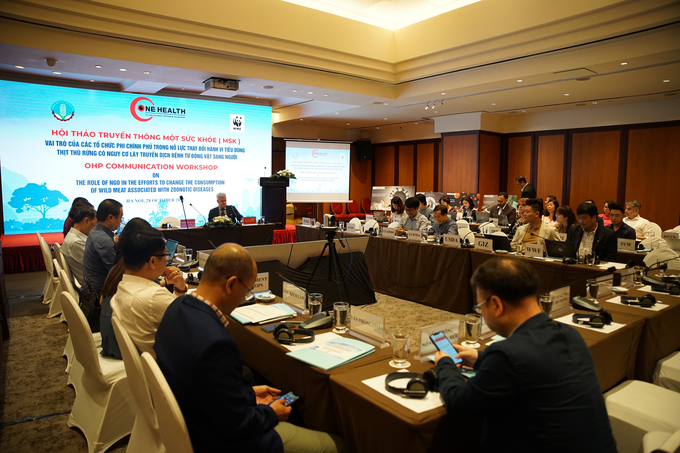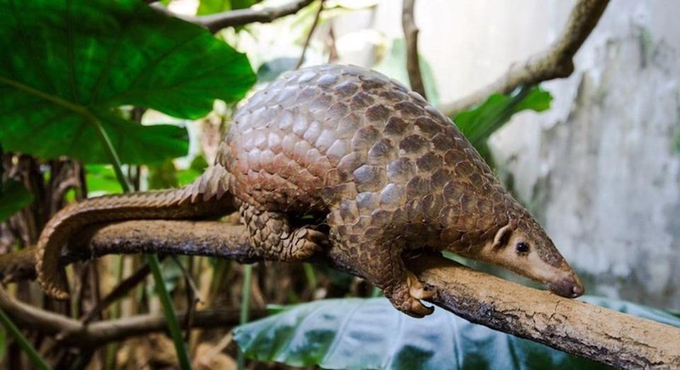June 19, 2025 | 04:17 GMT +7
June 19, 2025 | 04:17 GMT +7
Hotline: 0913.378.918
June 19, 2025 | 04:17 GMT +7
Hotline: 0913.378.918
On October 28, MARD in collaboration with World Wild Fund -Vietnam (WWF-Vietnam) cojoined the One Health Partnership Communication Workshop on "The role of NGOs in the efforts to change the consumption of wild meat associated with zoonotic diseases". The event is within the framework of agricultural cooperation and the implementation of One Health Plan on preventing zoonotic diseases.
The objective of the workshop is to support the implementation of certain One Health Partnership goals during the period 2021-2025, in accordance with the cohost plan agreed upon by the Ministry of Agriculture and Rural Development, the Ministry of Health, the Ministry of Natural Resources and Environment, 29 international development partners, and nearly 40 non-governmental organizations. The strategy focuses on mobilizing the resources and efforts of non-governmental organizations to reduce the danger of zoonotic disease transmission.
In addition, the workshop establishes a framework and dialogue for NGOs and cross-sectoral cooperation to decrease risks of zoonotic disease transmission and promote food safety management through communication initiatives aimed at lowering the consumption of wild meat.
Epidemics in animals and the danger of transmission to people are caused by the unlawful importation, transportation, and slaughter of poultry and cattle, particularly disease-carrying wild animals. The unpredictable evolution of the global pandemic situation necessitates the collaboration of government and international partners, including the major contribution of nongovernmental organizations.

Workshop on "The role of NGOs in the efforts to change the consumption of wild meat associated with zoonotic diseases".
Recently, the Vietnamese government has taken serious measures against illicit poaching and wildlife trafficking. It signed and issued a directive on wildlife management in 2020, which includes halting the entry of animals until new guidelines are established and eradicating illegal wildlife trading and trade regions with vigor. In addition, Vietnam has actively collaborated with foreign groups, such as WWF, to rescue and release animals such as bears, saola, etc. back into the wild.
"In order to help Vietnam in building an institutional framework to regulate, control, and guarantee the safety of humans, animals, and the environment, and to increase awareness about the consumption of wildmeat, in particular, it is vital to have the hands of stakeholders, particularly NGOs.
These are organizations that can provide, mobilize intellectual resources, finance, and effectively support public health initiatives, raise public awareness about food safety, reduce demand, and urge the public to turn away from wildmeat consumption, " Director of the Department of International Cooperation at the Ministry of Agriculture and Rural Development, Mr. Nguyen Do Anh Tuan stated.
Mr. Bill Possiel, Director of Preservation at WWF-Vietnam and co-chairman of the Workshop, urged NGOs and stakeholders to work together to transform the knowledge and consumption of wild animal meat by all social classes in Vietnam. Facts demonstrate that zoonotic diseases may transmit to humans. Refusing to ingest wild animal flesh was the greatest approach to safeguard both the health of the community and the uncommon genes of wild animals.
"Each NGO, social civic organization, and the social professional group has its own unique function and area of expertise. Viet Nam OH Program, whose core is the co-chairmanship of MARD, MOH, and MONRE, is the only way to successfully safeguard communications health, and wildlife, and preserve and develop natural ecologies in a sustainable manner ", stated Mr. Possiel.
For instance, on 21 October 2022, as a reaction to the OH approach, WWF-Vietnam initiated a communications campaign aimed at reducing the consumption of wild animal meat for the preservation of human health and the environment. Consumers would be informed of the severe health hazards associated with consuming meat from wild animals so that they might choose to alter their behavior for the sake of their own health and that of their communities. The program will also target the general population in an effort to alter societal consciousness and reduce the probability of pandemics. The program is being tested in Vietnam, Laos, and Cambodia, where the eating of meat from wild animals is prevalent.
Discussing the importance of nongovernmental organizations in behavior modification communication campaigns, Mr. Nguyen Van Long, Head of Wildlife Health and Conservation -WCS Vietnam, stated that this organization is primarily concerned with Future focus on research efforts, the hunt for viruses on animals to give scientific evidence to improve and support communication activities and actions to alter and evaluate Vietnam's wildlife trafficking, wildlife trading, and wildlife consumption prevention and control legislation.
"In the near future, WCS will coordinate with the Department of Animal Health - Ministry of Agriculture and Rural Development to search and detect SARS-CoV viruses and strains of the coronavirus family in domesticated wild populations or wild populations of animals that have close contact with farms or rescue centers," said Mr. Long. This will be solid scientific proof to prove that wildlife has been a source of shelter and disease transmission. And it will be involved in communication activities.
SAVE Vietnam Wildlife designs its communication programs and campaigns centered on the wildlife supply chain, which includes hunting, shipping, captive breeding, restaurants, and consumers.

Consumption of wild meat increases the risk of transmission of zoonotic diseases.
According to Mr. Pham Van Thong, Head of the Organization's Conservation Research Department, there is still a deficiency in the management of wildlife farms despite the existence of a Law on Animal Health. This is also the theme on which this organization promotes dialogue.
Regarding the tactics and operations of social groups, NGOs, and altering the habit of wild game meat eating, the Communications Director of Pan Nature, Ms. Nguyen Thuy Hang, stated that there is no rule that penalizes consumers, thus communication is crucial.
The activities of Pan Nature are divided into two areas: a wildlife information website with educational content on conservation and warnings about illegal wildlife consumption behaviors; and building communication campaigns on social networks Facebook and YouTube, focusing on potential objects of wildlife consumption in an effort to alter the perception of a segment of consumers. She also emphasized the importance of the media in increasing public awareness and combatting wildlife trafficking through training sessions, propaganda workshops, and wildlife trade-related field trips.
Within the framework of the One Health Partnership Framework mechanism on communication to change wildmeat consumption behavior, experts from FHI360 - a nonprofit human development organization dedicated to improving lives in a sustainable manner by advancing integrated, locally driven solutions, the HSI Organization for Animal Welfare, the Transform Project of the Cargill Group, and TE Food have proposed future solutions and activities to change wildlife consumption behavior.
Experts recommend enhancing policy communication in addition to mass communication since policies have a significant impact on consumer behavior; encouraging the consumption of chicken and fish for family dinners indirectly affects wildlife consumption habits. fostering experiences for individuals and organizations on wildlife conservation; enhancing the knowledge of target groups directly related to the handling of illegal wildlife trade and consumption, such as forest rangers and customs officers; and promoting the control of animal husbandry and safe consumption of wildlife in order to prevent illegal wildlife consumption and exploitation.
Translated by Dieu Linh

(VAN) To address plastic pollution, closing the plastic recycling cycle will bring significant economic and environmental benefits.

(VAN) According to the Binh Thuan Department of Industry and Trade, in the first five months of 2025, Binh Thuan's dragon fruit export turnover increased by 20.65% compared to the same period last year.

(VAN) EU countries on Thursday gave final approval to new tariffs on fertilizer imports from Russia, a move aimed at cutting off revenue that could support Moscow’s war in Ukraine, despite concerns from European farmers.

(VAN) The working delegation from the Ministry of Agriculture and Environment conducted an important trip to the Netherlands to strengthen strategic partnerships and sustainable development in the agricultural sector.

(VAN) The letter ‘A Plea from the Ocean’ not only evokes emotion but also awakens the human conscience to the responsibility of protecting life on Earth.

(VAN) The Department of Agriculture in South Africa has announced the country’s first mass vaccination of poultry to prevent local birds from contracting avian influenza.

(VAN) Establishment of the Mekong Delta Regional Agricultural Linkage Center, aiming for a closed value chain, deep processing, trading platforms, and international market connectivity.